
Jesse at Edinburgh Film Festival Photo: Max Blinkhorn
Adventureland - out in cinemas on September 11 - is the latest film to cast a nostalgic eye back to the Eighties. This sweetly comic tale stars Jesse Eisenberg as a graduate who finds his dreams of travelling Europe shattered by the economic downturn and replaced by a job at the local amusement park. While there, however, he doesn't just learn how to hoodwink the punters and avoid giving away a "giant ass panda" but about friendship and the vagaries of love. The film had its UK premiere at Edinburgh Film Festival and we caught up with Jesse to talk about the role.
Q: Although this is quite familiar ground in terms of subject matter, it felt really fresh to me and I wondered if you enjoyed it and if that was something that attracted you to the script?
JE: Yes, the most appealing thing was how the characters were so authentically drawn. Because this could easily turn into a genre picture - like a broad comedy or a coming-of-age story - and it wasn't that. All the characters were depicted respectfully, even the smallest of parts seemed somehow three-dimensional.
Q: You were four or five at the time when the film was set, in 1987, so did you have to go away and look up the period?
JE: We did a lot of improvisation in the movie so I wanted to make sure that if I had to say something that referred to anything specific in the period that I didn't get any of the names wrong. So it was mainly practical research for that, as opposed to any kind of big sociological trends because that was less important and, because it is not that different from when we filmed it.
Q: Can you tell us a little about how the improvisation worked?
JE: I'm not sure how much actually stayed in, but we did so much because... at the time I thought: "It's because I'm so brilliant and he wants all my lines to be in", but, in retrospect, I think he probably cut everything we made up out and just let us improvise to create a naturalistic tone, so it didn't feel like we were just making, like, these three jokes in one scene and then going on to the next scene. Some stuff stayed in but, ultimately, I think his script probably won out. But I think the idea was just to create a naturalistic comedy - not having to hit jokes on the head.
Q: There's some great performances in here, I wonder if you could tell us a little about working with Kristen and Ryan Reynolds?
JE: Well, Kristen... I was so shocked when we started working because she was 17 at the time and I didn't know how a 17-year-old girl would be able to play such a character who seems so dark and mature and jaded and cynical but also warm. She was just so perfect for it. And Ryan Reynolds - they condensed his schedule into two weeks - so it was two weeks every day with him and it was great. He's also a very funny guy, in terms of improvisation, he also likes doing that. He's great for the part, too, because you want to hate that character but, again, what you were saying about all the characters being three-dimensional, it's hard to hate that actor - he's so charming and seems like a genial guy, so it makes that character more authentic.
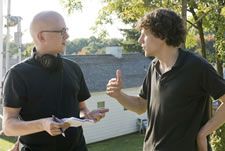
Q: Greg Mottola said it was partially based on his own rubbishy summer job, so, inevitably, we have to ask you what was your most rubbish summer job and did you draw on any of those experiences for this?
JE: I've never been able to describe anything I've done as 'rubbish' because we don't use this word, but I've done a million shitty summer jobs, er, I mean jobs, but most of them were acting in awful things. The only thing really similar was when I was 15, I acted in this thing and then I got too old for it so they had us do the lighting for it and stuff. And we all hated doing the play, but it was a really good bonding experience because we hate what we were working on so we had to find something redeemable, so we ended up enjoying each other's company that much more.
Q: You've talked about the improvisation being cut out a lot, was there anything that you really hated to lose?
JE: Yes, my favourite scene... this movie takes place during the Iran-Contra scandal and there was all this funny stuff and he cut it out. I liked it because my character was interested in the politics of the day and I was trying to talk to the other people at the park in the parking lot one night, and everybody was standing around drinking, I said: "Did you guys see this, I can't believe this stuff." Talking about being fed up with Iran-Contra because it was a huge scandal in the States and they're like "Okay". I loved that scene because it was a perfect indication of that culture clash and now its cut. So I was upset. But... all the kissing scenes are in. That's good.
Q: In the past you've worked with veteran actors. You're the lead here, how does that responsibility feel?
JE: It feels good. But you feel the pressure but at the same time it was good because it just felt like we were all playing real characters, it didn't feel like: "I'm supposed to be a leading person therefore it must be A, B and C." It just felt like, play this character normally and it will come out well.
Q: The character that you're playing is a little bit younger than you are and it's all about first love. Did you find yourself tapping in to those things, was it harder to act 'younger' than yourself than older?
JE: In some ways I felt the character was more mature and experienced than I was. Because I've never had a real job like this for an extended period of time. He's also trying to reconcile being naive in the world and being educated and being really smart and having these goals for himself - lofty goals of going to grad school and travelling to Europe and being a travel essayist. But I feel like personally, I want to do like these great things but then you're, like, doing a silly movie or auditioning for some stupid movie. So I feel that conflict all the time, but I think everybody feels that way. Like I want to be a novelist and yet I have to go to the set and do this stupid thing today. But everybody has that, the difference between what you feel you deserve to be doing and the thing that you're actually require to do, or hired to do.
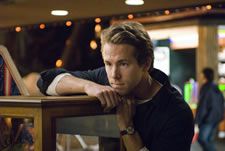
Q: You mentioned a favourite scene that was cut, do you have a favourite scene that's in the film?
JE: I only saw it once, and I tried to look away because I'm embarrassed to watch myself, but the scenes I like the most are the quiet, talking scenes with Kristen because those felt like the most sincere parts of the movie to me, when I was filming it, at least.This feels like the heart of the movie, this sweet relationship. They're not the funniest scenes but they felt like the most enjoyable for me.
Q: I thought the scenes with the other actress were just as sweet?
JE: Margarita Levieva? She's also great because that character could have also been, and in someways is, the hot girl at the park. But on the other hand she has her own thoughts and her own goals and they're not typical of that kind of character. So even a character like that that could so easily have been this stereotypical thing becomes a fleshed out character.
Q: Where do you place this film in relation to others? Do you see it as being more part of the American independent scene or do you see it as being more like Superbad and those sorts of movies?
JE: I saw the movie as an independent movie - and that's how it was made. It was not made for a lot of money. The only difference was it was made with a distribution company - Miramax was going to put it out. But in terms of the way it was made, shot and cast it was all independent. They didn't have to cast famous people, we didn't have a lot of time to shoot it, we didn't get paid any money. The best part was they didn't look over the director's shoulder. I would never have been cast in the main part if this was a major studio, so he got to make the movie that he wanted to make because the Superbad movie was so popular.
Q: You talked about your favourite scenes – what about your least favourite scenes? You seemed to get drowned every ten minutes. You're in the swimming pool in one scene and get covered in water in another. How long were you shooting that for?
JE: Oh yeah, that was the worst thing. We filmed, like in November, end of November, beginning of December, even, in Pittsburgh, Pennsylvania and they made fake rain. And when you make fake rain in movies, you have to make the drops bigger, because little drops, like real rain, don't show up on camera. And it was so freezing, it was torture. And then we had to reshoot it because it didn't come out good or something, it didn't look like New York City or whatever. But, yeah, it was terrible. I don't know why it has to rain at the end of every movie, because it's so hard to do that. I've been in many movies where it's rained and it's just torture. They try to put on scuba gear underneath but it doesn't work.
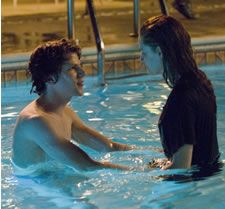
Q: Was part of the appeal of taking the role, working with Greg?
JE: No, I just liked the script, I mean, yeah, that was like an added thing, but I never really think about that because I don't really fully understand what directors do... if they've made a movie that's successful, doesn't always mean they'll make something that's good again. But I think he's proven he has like a really nice handle on it.
Q: So it's script first for you, then?
JE: Yes, absolutely, yes. Also, the best director can't make a movie good. I mean, I've read scripts that my agent is saying, 'So-and-so, the greatest director is going to make this', and I'm like: 'But it's terrible' and then it always comes out terrible. And that happens all the time, I mean, good directors make bad things. I mean, not that my opinion is always what happens, but I always agree with my opinion later down the road when the movie comes out, even if people like it. Well, it doesn't matter, but yes, if the script's not there, usually it's hard to make anything good out of it.
Q: Apparently Greg used to be an actor. Does that come through with his approach to film-making?
JE: I think he was an actor in a Woody Allen movie, because his wife was Woody Allen's assistant. I think Woody Allen needed to have somebody play a movie director, so I think he asked him, but I don't think he acted. He's like an extremely shy guy, so I don't think he would ever act. But he was the most sensitive director I've ever met, to actors. As I said, he was letting us improvise and I think that, in retrospect, that was just to make us comfortable, I don't think it was for new ideas. And so I think, yeah, he was really sensitive.
I've met directors who were actors and sometimes it's like they really do want to be actors so that kind of colours it like they're a little bitter, so I've seen that side too, so I don't think it necessarily makes them more sensitive. But he also once told me he thinks acting's such an emotionally difficult job and it is – you have to be in an emotional state for 14 hours a day, even if it's a light scene, you're still emoting, somehow. And so he always expressed a sensitivity to that and it comes through in the movie, all the characters are seen to be dealt with sensitively, even if they're doing something bad.
Q: The film was at Sundance and Edinburgh. How's it been to take the film on the festival circuit rather than go straight into release?
JE: I prefer that. I did a Sony movie that's coming out in October [presumably, Zombieland] and it's like a big movie and we're already doing publicity for it and I don't really like that. I mean, not that I want to go get lauded at film festivals, but I like that movies have to prove themselves at film festivals and then when the movie finally does come out, it's already kind of over some hurdle, whereas like a bigger movie, there's so much money and resources behind it that the movie's quality is somehow secondary, so when they put the movie out, it's almost regardless of its own merit.
Q: And how do you find the interaction with the people at festivals, going to the screenings, doing the Q & As and so on?
JE: Yeah, it's okay. I mean, I don't really like talking about myself, even though that's what I'm doing now, but you do it because you're supposed to promote the movie. So I could live without it, quite frankly, I'd prefer to just be acting somewhere, doing something else or whatever. But, yeah, it's nice. It makes you want to do good movies though, because if you have to talk about it so much, you know, you hesitate before you do something bad.
Q: Having said all that about choosing roles based on the script first, are there actually any directors you'd particularly like to work with?
JE: No. No, because I feel like if somebody's really great, I don't want to be in their movie, because then I'll just feel like I'll screw it up. I don't want to screw up somebody's movie.
Q: Why would you think you'd screw it up?
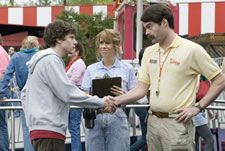
JE: I don't know, I hate myself in movies, I feel like I've ruined all the things I've done, but I still like doing it, so I don't know... I don't know, I feel conflicted, but like, I don't know, if there's somebody like Steven Spielberg, I wouldn't want to screw up a Steven Spielberg movie. I mean, not that I want to screw up Greg's movie either, but he chose me, I didn't pursue it like, you know, actors pursue Steven Spielberg or something, so I felt like it's his fault if it's bad.
Q: You'd be perfect as the lead in a Woody Allen movie, as the kind of Woody Allen substitute character.
JE: I love Woody Allen, he's the greatest. Greg's wife was Woody Allen's assistant and Woody Allen saw the movie and sent Greg an email, saying how much he liked it. He said, “I imagine the box office receipts will be in inverse proportion to its quality”. (laughs) That's very funny.
Q: So, hypothetically, if Woody Allen had a script he said was perfect for you...?
JE: Yeah, I guess so. No one ever says no to him, I guess, right?
Q: How does it feel when you get a plaudit from someone you respect like that?
JE: Yeah, it was great. I was shocked, like, I can't imagine Woody Allen sitting there watching another movie, just watching something and paying attention to it. But, yeah, it's like a great honour.
Q: What's your next project?
JE: I'm supposed to do a few movies but the one that I think is most likely to happen is called Midnight Sun and it's about these two young guys at Columbia who got recruited to work on the Manhattan Project, the atomic bomb, in New Mexico. And it's a true story, it's like this incredible, very tense story. And there's an English girl in it, playing my wife – Felicity Jones. So it's like the three of us are the main characters, going to New Mexico and starting to work on this project. It's really an interesting movie and the Pentagon is letting us film at Los Alamos. It's written and directed by Chris Eigeman, from Metropolitan.
Q: It'll be nice to see you play someone who's married too, after so many coming-of-age movies.
JE: Yes, I've finally tied the knot.
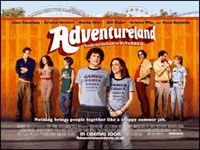 |





















